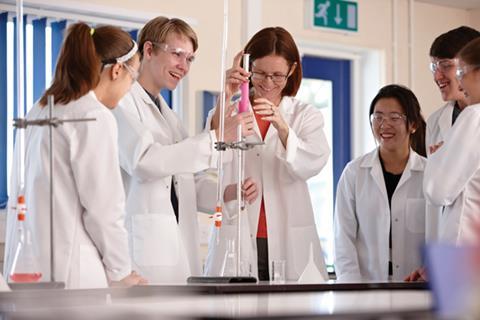A dedicated schools' chemistry lab in the department of chemistry at the University of Sheffield provides school students with a front row view of HE chemistry

Over 300 secondary school and college students, from Y7 through to Y13, as well as some 30 primary school pupils and a group of non-specialist chemistry teachers have, since its opening last November, taken advantage of a dedicated schools' chemistry lab in the department of chemistry at the University of Sheffield. The modern, fully equipped lab is placed strategically within the physical chemistry undergraduate teaching lab and fronted by sliding glass doors which give school students a bird's eye view of what it would be like to study chemistry at university. Classes of up to 15 can use the lab at one session.
The 'school lab' is the brainchild of experimental officer in the chemistry department, Brian Taylor. Frustrated by the limitations of running only summer sessions for schools back in the early 2000s, Taylor could see advantages of having a dedicated lab for schools and colleges that would be open all year round but at the same time not interfere with undergraduate teaching. Dr Simon Jones, senior lecturer in organic chemistry and coordinator for schools' and colleges' outreach projects within the chemistry department, set about securing the funding for the lab.
With financial backing from National Endowment for Science, Technology and the Arts (NESTA) of ca £45k and ca £60k from the HEFCE-funded RSC-led initiative Chemistry for our future (CFOF) in 2006, Taylor's dream has become a reality. The NESTA money paid for six state-of-the-art fume cupboards, CFOF funding paid for the refurbishment of the lab and one full-time technician. In 2007 CFOF extended its financial support of the project by funding an RSC school teacher fellow for a one-year secondment. The current school teacher fellow, Will Davey, designs and prepares the activities for schools and colleges, thus making sure that these are of the appropriate level for different groups of students. The lab has also recently gained support from industry - Aldrich Chemicals provides a range of chemicals free of charge.
According to Jones, the emphasis on the practical work on offer depends on what teachers want to do. 'Some teachers', he explained, 'come in to use the labs with their sixthformers to do specific experiments which they can't do in their schools or colleges. Organic syntheses are particularly popular. Others come because they want their students to experience what it's like to work in a university environment. So then we put on something they wouldn't necessarily have come across to show them the relevance and excitement of practical chemistry. The synthesis of paracetamol from 4-nitrophenol is an example'.
And according to Davey, 'Without exception all the teachers who have accompanied students to the lab want to come back as soon as possible with more students to do more practical work. Their students go back to school or college with a sense of confidence about practical work and a real buzz about chemistry'.
In the long-term Jones and his colleagues will be looking to run the lab in a sustainable way. With already a legacy of support from the Rotherham Local Education Authority for outreach projects, courses aimed at developing technical and laboratory-based skills for students not going onto HE might be a possibility, according to Jones. For the immediate future, the lab has bookings from schools across the north-east region, as well as CPD sessions for teachers and practical sessions for PGCE chemistry students.
Related Links
Sheffield department of chemistry
Learn more or book a session for your class






No comments yet